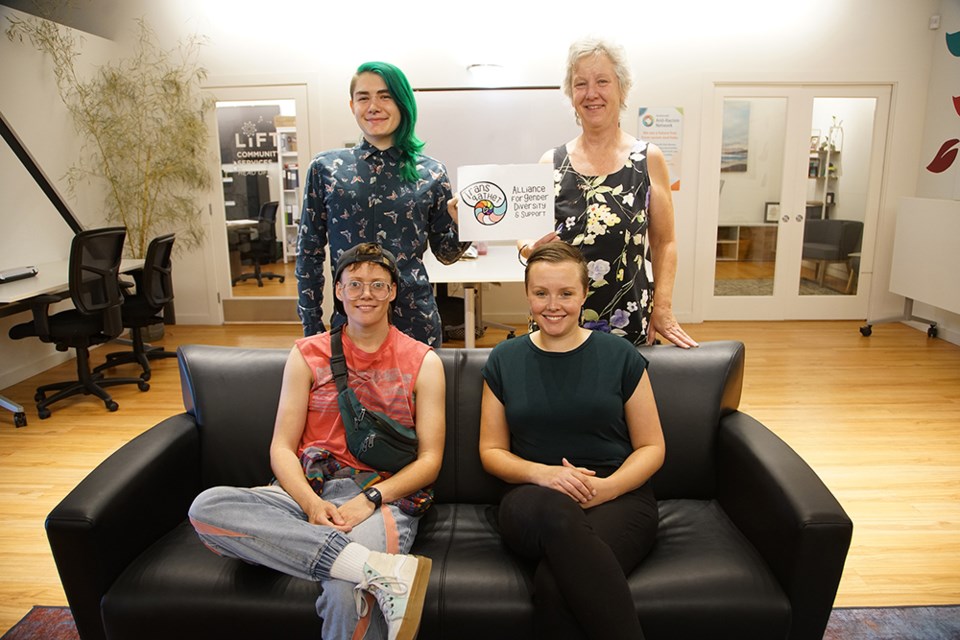Through Trans qathet: Alliance for Gender Diversity and Support, transgender and non-binary people, those whose gender identity is different from the sex assigned to them at birth, have a new foundation of community resources.
Kathryn Colby, Lift Community Services manager of community development, said a couple of years ago, right before the COVID-19 pandemic, it was brought to Lift’s attention that gender diverse supports were not in place in Powell River.
“There was no support for people who felt like they didn’t fit into the gender binary,” said Colby. “There was no support for people who were actively transitioning or were a different gender than what they were assigned at birth. TransCareBC came out with a funding opportunity for communities that had no support to put programs in place.
“We did some preliminary research and spoke with eight families. After we interviewed, we realized there was a huge gap, and we determined the best way is through peer support. There’s a lot of evidence of how powerful peer-to-peer support is.”
Colby said Lift applied and funding was granted. Lift was able to hire relational coordinator Laurance Playford-Beaudet, and several peers were also interviewed to join the program. Colby said Lift relied on Playford-Beaudet’s lived experience to inform what the program would look like and how it would be formed. The program started in earnest when Playford-Beaudet was hired at the end of May.
Playford-Beaudet said the initial work has been generating what the program will be, and that there has been work undertaken, brainstorming all of the events that can be organized, and what Trans qathet wants to provide.
“It could go in a lot of directions,” said Playford-Beaudet. “We have a lot of really big ideas and we are deciding which ones to enact. The summer has been a really creative time. We’re planning some in-person events and providing support in any way that trans and gender diverse people require.”
Colby said part of the process is raising awareness that there are people who are gender diverse in this community, adding that having visibility is important for people who live in identities that can often feel isolating in a small community. There will be an alliance of people who are gender diverse, and gender diverse people will know they belong there, added Colby.
Jess Pikkarainen, one of the program’s peers, said there are Facebook and Instagram pages that have been set up to help communicate.
“We just introduced ourselves on social media, so that’s a big part of that visibility,” said Pikkarainen. “It’s about letting people who need us know that we are here.”
The social media presence can be found by entering @transqathet into either social media platform.
Open for evaluation
Colby said the full need of the community is not yet known.
“We know there are gaps, we know there are needs, and we don’t fully understand what those needs are, and we won’t know until folks are able to reach out,” added Colby. “It’s open for evaluation, and responding to community needs is the goal.”
Zeke Chambers, another of the program’s peers, said development will take place as long as needed because people’s needs are going to be constantly changing.
Trans qathet will also be working toward educating the broader community. Colby said a delegation will be appearing before city council on how to be good allies to those who are trans and non-binary. Trans qathet is also available to make presentations to non-profit organizations and businesses.
Colby said TransCareBC also has an amazing wealth of information and an audit process where people can go through checklists and other items to make sure a business or organization is as safe as possible regarding communication and action. Colby would like to see an audit done of the entire community.
Colby said interactions with Trans qathet are confidential and added that they want to treat people in the way they want to be treated.
“Our first rule here is really making matters for those who are living outside the binary, or thinking about being outside the binary, to feel comfortable and safe,” said Colby. “They have allies here who they can rely on.”
Non-binary people face challenges in society and it’s a day-to-day matter, said Chambers. For example, people need to be educated on proper pronoun uses. Chambers said they/them pronouns are commonly used.
“A lot of people aren’t grammatically sure how to use those pronouns, or they are uncomfortable using them, but it’s much better to just try,” said Chambers.
Colby said if people are unsure, they should use they/them and gender-neutral words like person, rather than he or she and sir or madam, until learning otherwise.
“One cannot assume another’s gender, ever,” said Colby.
Lots of work ahead
Annabelle Tully-Barr, another program peer, said society is at a time where it needs to deeply listen and respect where everyone is at.
Playford-Beaudet said there’s a lot of work ahead, but believes there will be a lot of wins.
“Any time someone who is gender diverse comes to us and feels seen and heard, it will be significant,” said Playford-Beaudet. “We have a lot of challenges, and the work will probably never end, but it will make a difference.”
Tully-Barr said the efforts will be key to saving lives.
“That wraparound support can make or break a person going through something like this,” said Tully-Barr. “Families need to understand their roles as advocates, cheerleaders and listeners. It’s important that families embrace and get on the side of the person going through a transition.”
Colby said there is a higher incidence of suicide among gender diverse people.
“It’s shockingly high,” she added. “It’s a major public health concern.”
Colby said people in the community can get in touch with Playford-Beaudet or the peers to reach out for direct support.
Playford-Beaudet said people can reach them directly by emailing [email protected], or by calling 604.485.2004, extension seven; or via social media channels @transqathet.




